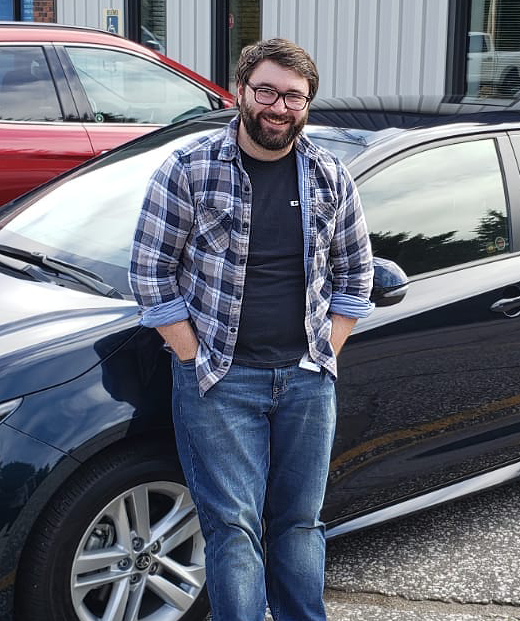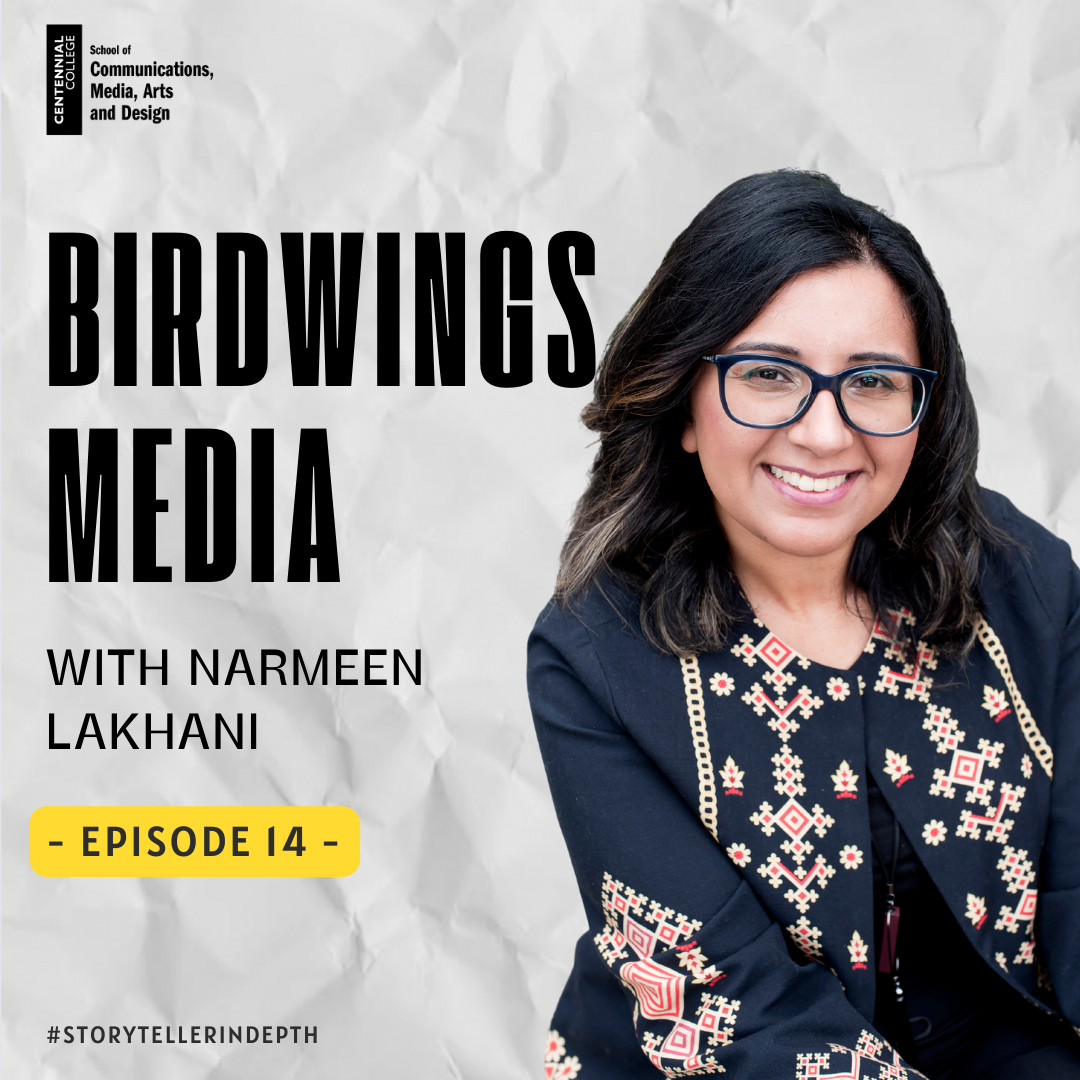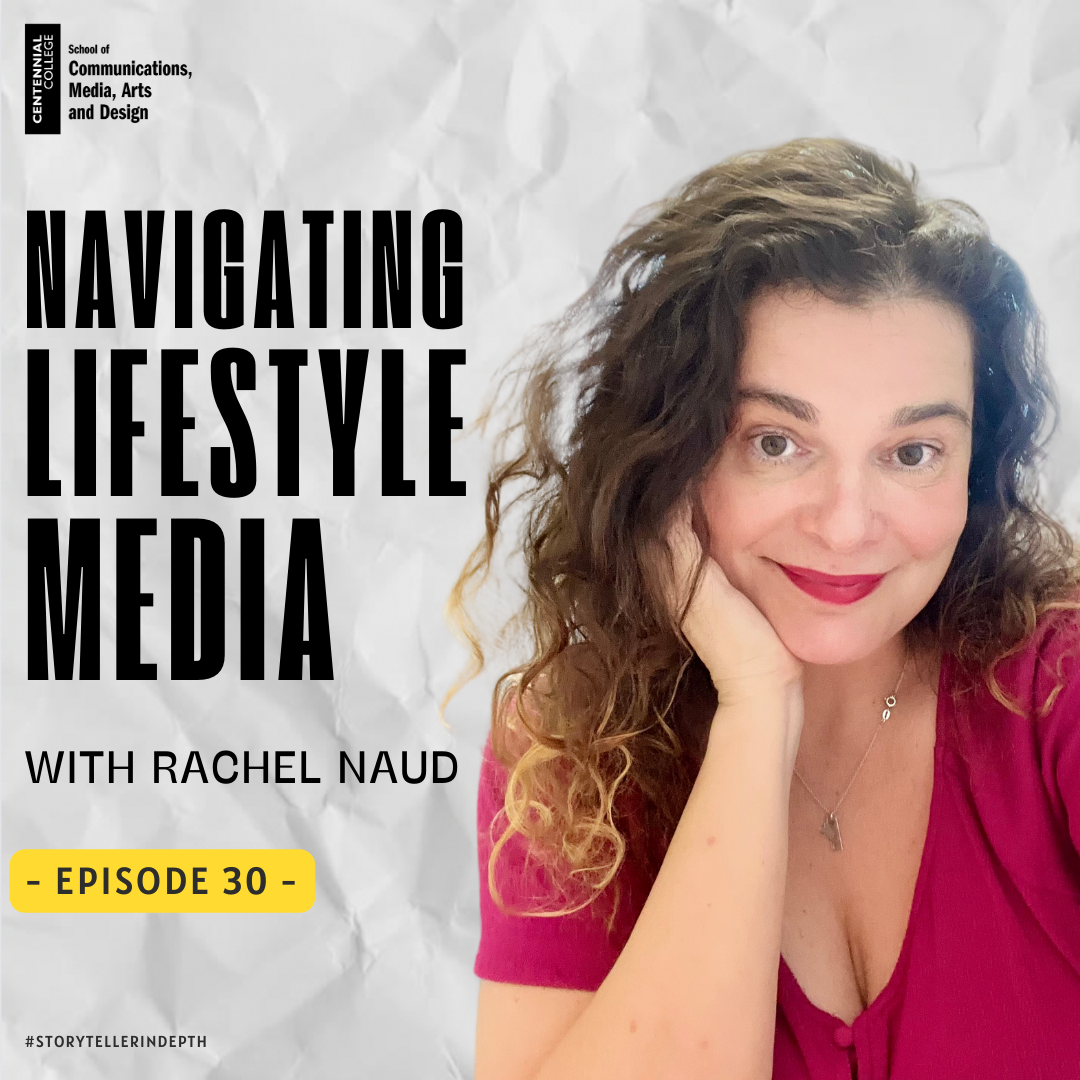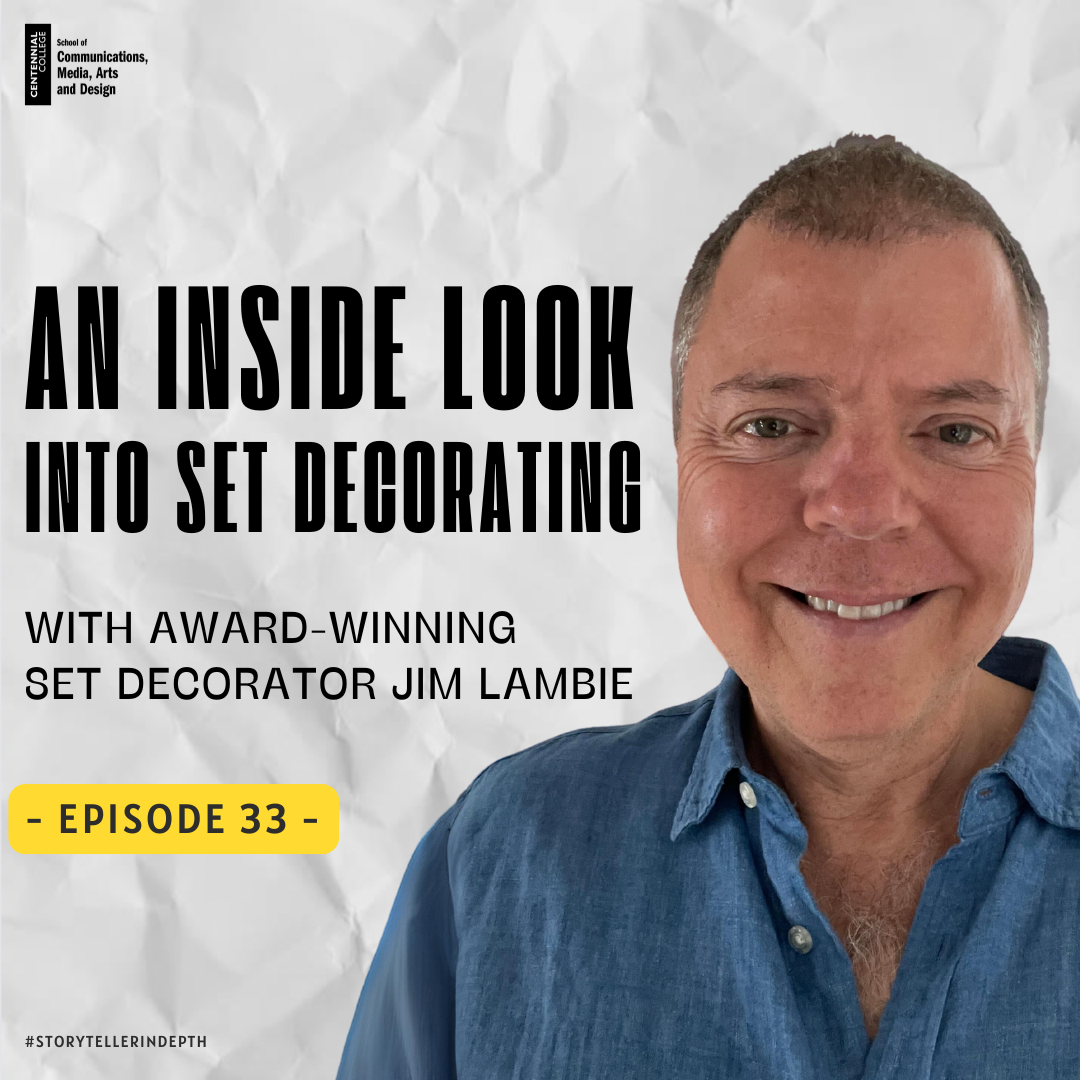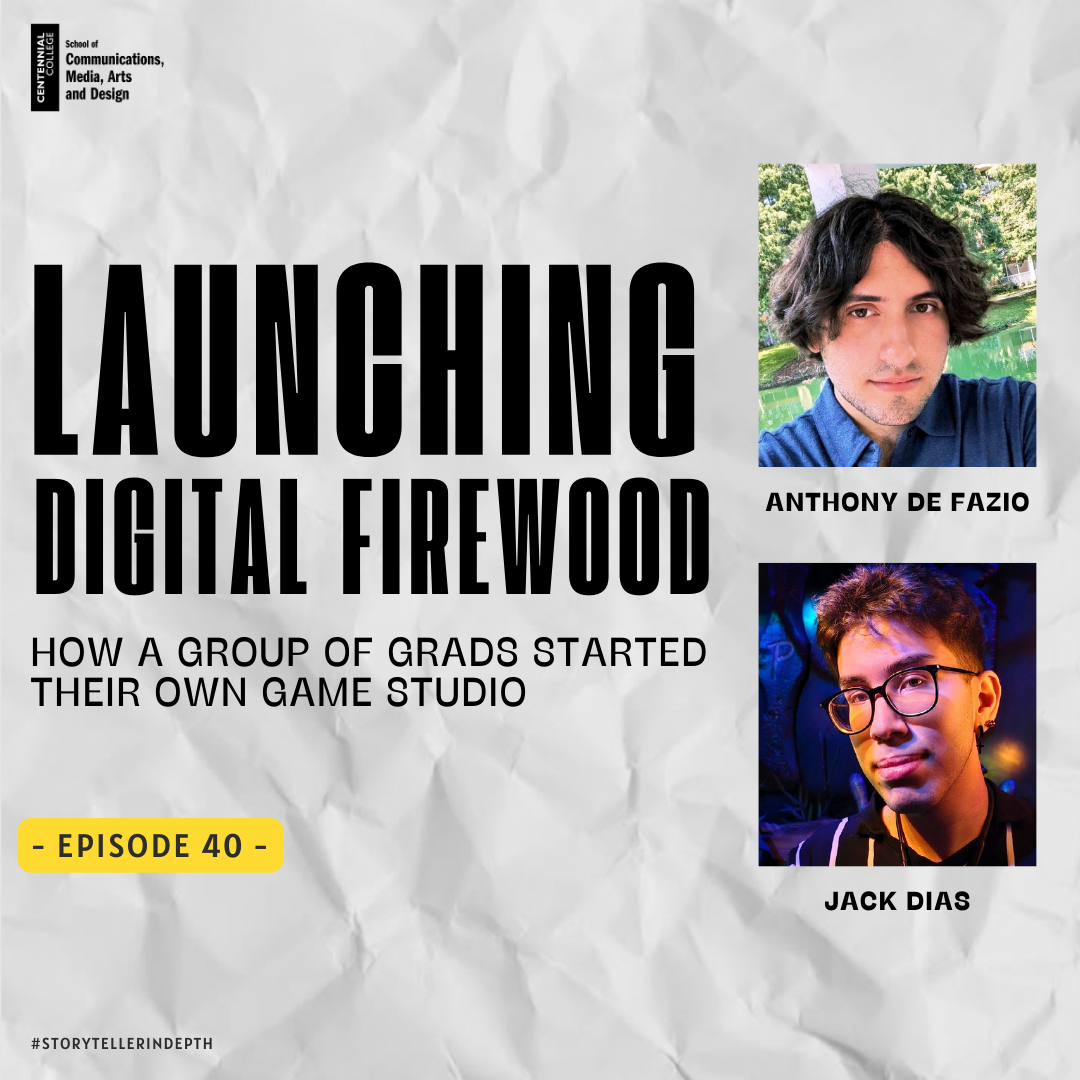Episode Transcript
[00:00:00] Speaker A: Hello and welcome to Storyteller In Depth, a podcast where we go behind the scenes to learn more about the School of communications, media, arts and designs, people, places and things. I'm your host, Pat Quigley, and in this episode we'll be speaking with Narmin Lacani, a graduate of our Children's Media program and founder of her very own startup, Birdwings Media, where she creates diverse content for preschool and school age audiences that parents and educators can use to teach about Muslim contributions to society society. She also offers consultation and training to youth related industries on more equitable narrative representation. Narmin will share why she launched Birdwing's Media and we will dive into some of the reasons why inclusive storytelling and representation are so important, especially in children's media. Be sure to stick around.
Thank you so much for being on the podcast today.
[00:00:55] Speaker B: Yeah, thanks so much for having me. It's good to be back at Centennial.
[00:01:00] Speaker A: Yeah, no, thank you for coming back and for chatting with us about you most primarily. Right. To come onto the podcast. It's really, really cool. So just before we kind of begin, can you tell us a little bit about yourself and take listeners through the steps of starting Bird Wings Media and how the idea goes back to your time in the Children's Media program?
[00:01:22] Speaker B: Yeah, for sure. I was in the Children's Media program about five years ago, so I started 2017, finished 2018, and prior to that, I was in the media and communications industry for over ten years, working in NGO and international development sectors. And my passion was always for social change and related somehow to identity. So I think the overall motivation for Bird Wings Media goes back maybe even over 20 years ago to 911. Growing up as a Muslim child in Bible Belt like USA, like suburban Atlanta. And so that experience, I think through 911, war on Iraq, all these kind of media events really exposed me to the harsher realities of how representation in media makes a huge impact. Right. Children's media in particular, I never saw myself represented on TV or books or games or anything like that, but I had such a passion for them. They were sort of my know, after school, coming home to watch PBS Kids or the Scholastic Book Fair or things like that.
And I think I went more into like, in my graduate studies, leaned more on research that showed how Muslims were misrepresented in media. And so for a number of years I was working more sort of in traditional media and communications and strategic communications.
And I felt that at some point it's very hard to change ideologies once people are adults. Right. Like, it's sort of ingrained.
And I thought, well, what if we look at promoting these notions of pluralism and diversity and inclusion from a young age in kids instead?
And I had always, like, when I was younger was like, oh, I want to write for Disney and used to write poetry and win these school writing competitions and things. So I was always a creative person. But then I think the mission I had for this media representation kind of took me on a more journalistic route. And so I wanted to go back and explore, what does this kids realm mean, right? And how do I combine those two passions of wanting to see more inclusive storytelling with my own kind of childhood memories of having really great educational content?
So I had no idea, really, that children's media was even an industry. I just sort of started with a blank page.
And that led me to reach out on LinkedIn and through various resources to professionals in the industry, whether that was in publishing, whether that was in television, digital learning, all of those spaces relevant to kids. And one of those networking opportunities led me to Tbo Kids, where I met the creative director of the time, and she told me about this program at Centennial, and I had recently finished my Master's and wasn't able to go back to school until a few years later to actually take the program.
And then while I was in the program, it provided such a great introduction to all different aspects of the industry and a lot of, I think, tangible skills like writing business proposals and writing pitch decks and things like that. So Birdwings Media came out of one of the business courses in the program.
And I remember even at that point, just from my own research, even in the children's media program, my focus was on, okay, how are youth Muslims being represented in kids media? So I found during my research, my own work, that I was having a really hard time finding reliable content or information online. There was no sort of this hub or one credible source where you could go online and find information about Muslim narratives, especially in the kids space.
I think that's where Birdwing's Media started was through seeing my own gaps as a creator, even, and then gaps in the industry and saying, well, then how can I fill that gap, right, if no one else is doing it?
[00:06:28] Speaker A: Oh, for sure. And I mean, it's such important information to share too, right, to get that out to people. So there's no misunderstanding to give them that education, gives them the power to become stronger adults when they grow up. Right. To change that narrative makes it better for everybody.
[00:06:51] Speaker B: Exactly.
And the reason I was looking at parents and educators as potential audiences was because I do know a lot of like minded people or people invested in wanting to show more inclusive content. But if you start googling about Muslims online, you find a lot of inaccurate content, misinformed stories, and just a really wide range. There's so many complexities and layers to Muslim narratives that you would have to understand to be able to navigate that space. So there was no sort of, I think, easy or simple platform in my head. I was thinking, well, how do I create the National Geographic of Muslim contributions to society, right?
Or the PBS Kids or kind of that one reliable space.
[00:07:46] Speaker A: Yeah, for sure. And one of those things that you create is Muslims in a Minute, which is your educational media channel with short form content for preschool and school age children. So what has your experience been like creating this content? And how did you approach each topic for each age group?
[00:08:04] Speaker B: Well, I knew I mean, both from a resource point of view and from how young audiences are consuming content today, I knew that I wanted to focus on short form content, hence the name Muslims in a minute. Because most of my videos or content are around a minute, give or take, but because I think it's getting much harder and harder, even with myself and especially post pandemic, to have the attention span to watch a full documentary or longer episodes or films or things like that. And just producing that level of content without really large budgets and resources is difficult also.
So I felt that short form content would be a good place to start and test how young people respond to that content. So for preschool, I wanted to try out kind of simple animations, focusing on often a lot of firsts, right? So the first Pakistani female figure skater, the first Muslim woman in space, the first Stanley Cup winner.
So Muslims who perhaps could be role models for them or whose stories they could look up to. And I worked with an educator to provide worksheets that can go with each video for all students. So very universal concepts like if the first Muslim woman in space, if her dream as a child was to was looking at the stars and saying, well, how do I get there one day? So the worksheet might say, well, what do you dream? Know this universal question, what do you want to do when you grow up? Right? And how does Anusha and Sari inspire you? So I think it was like an interactive way for them to engage with that content.
And one of the goals I had was to incorporate this content into lesson plans and see it in the education system. Often we only hear of Muslim stories during Ramadan or Islamic Heritage Month or certain kind of token times throughout the year. But there's no reason the story about the first Muslim woman in space can't be in the science curriculum.
It's not about only showing Muslims in religious studies courses or in certain times, holiday times, holiday celebrations, eid, Ramadan, things like that. It's about, well, what are the everyday stories and contributions they've made?
So really, I think with the preschool content, it was kind of almost creating a world of heroes that they could look up to. And then the grades four to six a little bit of the school age content.
Very much comes out of my travel log across Pakistan. And so that covers so many things from history. So if I was in certain parts of the country where there was a lot of history of the Mughal empire, they learn about that. They learn about Islamic architecture, they learn about different sports or cuisines or music and art and how people kind of incorporate their faith or beliefs into that sense of community and the work that they do on an everyday basis as I was traveling through these different communities. So I hope that parents and educators will find them useful starting points just to show kind of the breadth of Muslim narratives right. That it's not limited to particularly theological themes necessarily.
I mentioned on my website that my approach to showcasing Muslim narratives has largely been through the lens, through a social cultural lens rather than a theological one, because I think there are so many different interpretations of Islam.
So it's not to expose people to any one interpretation, but rather to show how people practice Islam through their everyday life. Because one of the interesting things that I want, even when I do kind of education sessions for the workplace about inclusion, is that as Muslims, faith and world are intertwined. So being a Muslim is not something you leave at the door when you enter a soccer field or the classroom or anything like that. So being a Muslim is a part of all aspects of your life. So one of the videos I have is with an artist, and so he's a miniature painter who paints a lot of mountains, and the reflection of light on the mountains to him is a reflection of his face and noor right. The light of God and how that inspires him to paint these beautiful sunsets.
So that to me, is a Muslim narrative without necessarily going into particular forms of interpretation.
[00:14:04] Speaker A: That's so cool. It's true. To think about how to tell those stories and to share those things with such a large audience and being able to make it more than, like you just said, more than just that one time of year to share things with people.
It's incredible. It truly is incredible to be able to share those things with people. So thank you.
And you did say that you were traveling across Pakistan. So can you share a little bit about how this trip came to be and what type of content are you creating there?
[00:14:41] Speaker B: Yeah, I was born in Pakistan, but my family migrated to the US. 30 years ago. And then in the last few years, I had been coming back and forth.
Something I think inside was invoking me in a way to reconnect right. With my own cultures and traditions. Because if I'm at the end of the day, my broader goal is to infuse more Muslim narratives or expose western systems to more Muslim narratives. Then I think I also wanted to reconnect a bit more with the diversity of narratives in the country where I was born. And it also seemed, I mean, if I had unlimited resources, I would have loved to spend some time traveling the entire Muslim world so I could really showcase the diversity from one region to another. But with the limitations I had, the simplest sort of starting point was to come back to Pakistan, which is the second largest Muslim country in the world by population. And so I wanted to use that as a case study almost to show that, okay, just traveling across Pakistan, look at the wide range of cultures and traditions that I'm discovering. Right? So all that to say, can you imagine throughout the entire world what that diversity looks like? Because I think one of the major stereotypes that we as Muslims really struggle to challenge still is this idea of a singular narrative or a monolithic image of Muslims, right?
A lot of negative stereotypes, especially about access to education or women's rights or many things like that. And that's not to say that, like any other community, that some of those narratives, negative narratives, are not true. It's just that those negative narratives have been extrapolated and projected to seem like the full narrative. Right. Which is where I wanted to address the gap by saying, look. But no, there are all these other narratives that challenge those stereotypes.
I have one sub kind of series within my travel blog that's celebrating Muslim entrepreneurs, and a lot of them are women. And so there's one women social enterprise in this very remote area of northern Pakistan in the mountains, which teaches women carpentry. And so I was filming this, know, wearing a hijab and a chainsaw in her hand, and I was like, this is the image I want people to see, right, that this is an empowered woman.
Just because she looks a certain way or is from a certain part of the world, we can't be making assumptions about the limitations placed on them, right.
And then in each kind of different region of the country, I got to experience a lot of different things. And some of my favorite aspects, I wasn't just kind of working with kids or interviewing kids. Sometimes I was sometimes it was broader stories. But some of my favorite interactions were just kind of goofing off with random children because then you really are able to show that, look, they're kids just like everybody else.
So I was in this small village. One of my favorite videos, and a lot of my followers favorite videos was one I did in this small village. Again, very remote village near the Afghanistan border. It's called Chippursan, and this is a village that has so many resource challenges.
Just to give you an idea of the climate there, I was there in June, and at night, I had to wear my Canadian down feather winter jacket and two blankets to go to sleep in June.
And so their winters, right, like January and so on, are incredibly harsh.
But I was there in June and just randomly went to a polo. Ground polo is a very popular sport in northern Pakistan. And these kids, because of course they don't have access to horses, had created these metal cycles, invented their own form of polo and were trying to teach me how to play it. And even while I was filming my vlog and they were participating in it, they're making all these silly faces, they are giggling the whole time because they're camera shy, all of that. So we had a great time and it was just this everyday, universal childhood experience in a context that is so different from many parts of North America that I've lived in.
[00:20:10] Speaker A: That's so cool. It's so interesting, like you even said that they're not different from what people would consider from the North American culture, right? And just to see that just the relationship between the two is so interesting. Has there been any new insights you've picked up along the way as you've been creating content?
[00:20:32] Speaker B: So many. I think one of the things that was really important to me in doing this work, and I say this right off the bat on my website, is that this is a learning experience for me as well in challenging my own biases, because the Muslim world is so vast that I am one out of 2 billion perspectives. So as I was traveling, learning to challenge my own biases, learning to embrace new perspectives, to not judge situations or places that were unfamiliar to me, was a very similar exercise to what I'm trying to ask other people to do for myself or Muslim narratives at large. But I think even within the Muslim ummah, there's a lot of learning to be done. And so northern Pakistan was the first time I've ever lived in a rural context. I've always grown up in suburbs or really large cities, so the challenges of a rural context are very different.
I really had to acknowledge my own privilege, even when looking at education systems or socioeconomic systems or things like that. I really had to try to separate and I struggled with this. I think it's so sometimes it just takes time to really immerse yourself in a community and understand the layers and the history of that community before you can come to any kind of conclusion.
And so I think, for example, even if I looked at the role of women in that society, women's empowerment might look very different than it looks in other parts of the world.
And so you can't sort of compare apples to oranges, I think was my biggest takeaway, is really to keep an open mind about everything and challenge myself as much as possible to not limit my understanding of other people's narratives based on my own frame of reference or my own experience growing up.
So I can really appreciate, right, that inclusion is hard work. It's not easy. It's not meant to be easy. I think we often take it for granted, as well as just called being a good human being. It is, I agree, but that takes a conscious I think it's an active effort. I don't think it's something passive that we just walk into a world that's completely different from the world we're used to or that we've been raised in and assume that we're going to understand other people or that they're going to understand us.
And that is a universal experience anytime we're placed in different contexts or with people difference from ourselves. And there's such beauty in those differences once we're able to get to this place of real human connection at the end of the day, because that's where there was this elderly woman in the community who every single day she was like, she didn't speak my language, I didn't speak her language. But through our actions or expressions, she just was always showing me so much affection and treated me like a daughter and always welcomed me and all these things. People invited me into their home and beautiful, beautiful experiences, even though we had nothing maybe externally in common.
And I think it was that process, that journey, internal journey was one of the most challenging but rewarding experiences of my life and I think really will serve me and has informed how hopefully I continue to approach the work of equity and inclusion with a lot of compassion. Because we can't expect people to just walk up and understand who we are.
[00:25:45] Speaker A: Oh, for sure. Yeah.
You also sit on the advisory committee for the Children's Media program. Can you share how you approach this role and the ways you think academic institutions or art storytelling programs in particular, can make efforts to be more inclusive in their curriculum?
[00:26:04] Speaker B: Definitely. I think this is a really important aspect. My philosophy, when it comes to changing the narrative and the work I do, is really to be compassionate with people, but to hold systems accountable. And media and education systems play a huge role in social change. And so I think we have to be increasingly thoughtful about how we design curriculum and how we design media structures.
So myself and a lot of other alumni from the program sit on the advisory committee, and I think one of the advantages I've had in my life is to live in different parts of the world.
And so I really try to advocate for more globalization in storytelling because I think in that sense, the world is getting smaller and smaller, right. So we can't just look at the industry.
Even if the program is based in Toronto, I think it's to everyone's advantage to look at it globally, because I think every Canadian is connected, or every Canadian child is connected to another child in the world.
So I think inclusivity in that sense is really important to me and something I've been pushing for.
And second, the industry is changing so rapidly and so understanding how we can have more diverse voices, more authentic voices, but also how we can help people like myself who want to create their own space. Right. While we're waiting for these bigger systems to change and catch up to us, how do we prepare creators to take advantage of spaces that are more accessible? Right. So, for example, social media, where I'm posting my blog, is a more democratized space, right. Where you don't need to go through kind of pitches and there are less barriers to entry. So how do we support creators to leverage spaces or technology or innovative methods that help their voices get heard or amplified in a way that maybe traditional media systems didn't accommodate?
[00:29:12] Speaker A: Yeah. And also thinking about just the representation, right. Representation matters to so many young, developing children in our world that the more you're able to share somebody on screen or somebody through a device or however they're watching, the medium they're watching or listening to makes them feel special and important in such an inspiring way that they see themselves. And, like, I can do that too. I can be that person, or I can aspire to something more than what it would have been 1520 years ago. Right?
[00:29:52] Speaker B: 100%. I mean, I once had a meeting with a senior media executive, and I told him that I think, in passing, I told him that one of my nephews is hesitant to identify publicly as Muslim in his friend circles. And he was absolutely floored that this was happening in a country like Canada in 2023. Right. So I think often we don't realize the impact that this has on youth to be able to fully be themselves in whatever space they choose.
[00:30:35] Speaker A: Switching gears a little bit, we're going to talk a little about Islamic History Month, which is recognized across Canada each October. And it's a great opportunity to recognize, learn, and share more about Muslim heritage and past and present munduslim contributions to society. What are some of your recommendations that either parents, educators, or even adults themselves can do to honor this month and foster greater inclusivity in the media they engage with?
[00:31:01] Speaker B: Yes, absolutely.
I'm excited to return home to Canada specifically for Islamic Heritage Month, and I'm working with a number of studios and workplaces to conduct education sessions on Muslim representation and religious inclusion in the workplace and topics like that.
But Islamic Heritage Month is a great opportunity because often I think Islamophobia is this concern that is gone under the radar in Canada and in certain spaces where I think most people don't know that.
There's research, right? There's statistics and research that shows that Islamophobia today is much worse than it was at 911 over 20 years ago, which nobody knows. This. I think it's just more maybe it's not people smashing windshields like they did in my place of prayer at that time, but it's very much ingrained, this fear.
Research shows that Muslims are the most misunderstood or disliked group in Canada.
So I think it's really important to use this opportunity to dialogue, to create safe spaces and begin to affect change. The hate crimes against Muslims in Canada every year are rising exponentially.
And so for Know, the sense of urgency sort of outweighs the fear. So I hope people will really, whether it's in classrooms or in their homes, conversations with their kids or in the workplace or whatever it is, really take this time to acknowledge first the research or the challenges that Muslims in Canada are facing and how it affects all of society. Because Canada is, by and large a pluralistic society. We celebrate know, and people in the world admire us for that. And so really taking an inward look at how we can do better on that front. Not just for Muslim communities, for all communities, of course.
So many different ways on my website and social media, this Islamic Heritage Month in particular, because it is a Canadian observation, is to celebrate and highlight specifically more Canadian contributions by Muslims, to celebrate a lot of authors and highlight other stories. So I was part of a Muslim storytellers group in North America, kidlit group. And so I have done a bunch of interviews with other Muslim authors and their journey as storytellers and the stories they're trying to tell and how diverse they are. So I'll be highlighting those stories and their interviews as creators, as creative people, and also kind of doing sessions, like I mentioned, education sessions with a number of people in the children's media industry.
And I am happy to support anybody who reaches out, even just ask for resources on where they can get started to learn about different Muslim narratives. I think one of the things I would encourage people is to explore a range of voices. Because again, like I mentioned, mine is just one perspective or one voice. There's so many different creators and writers and filmmakers, scientists, artists, people of all industries and trades who are Muslim and have different voices to express.
So I think my goal with my work was just to expose people to that breadth of voices, right? That there's not just one voice.
So I would really encourage people when they're doing their own, putting in their own efforts and work also to search for those voices, to hear as many of them as possible, not just one.
[00:35:56] Speaker A: Or two, for sure. And if people wanted to follow you or to check out the content that you're creating, how would they do? So?
[00:36:06] Speaker B: I have an instagram channel. It's at Birdwings Media and a website, Birdwings.org.
Those are the two primary places where I will be updating content regularly and posting new Muslim stories. So I look forward to sharing them with more and more people.
[00:36:27] Speaker A: Yeah. And I can't wait to see all the content that you're going to be putting out. I know I'm going to be following you on Instagram and checking out the website every day through October to see what's going to be coming up. So I want to thank you so much for coming on the podcast. That.
[00:36:40] Speaker B: Thank you so much again for having me, and I appreciate I think it's a really gratifying feeling to come back to Alma mater after five years and reflect. In a way, this has given me an opportunity to reflect on my journey over those past five years, too, and how Centennial sort of helped me kind of create that launch pad into this journey.
[00:37:10] Speaker A: Thank you so much, Narmin, for coming on the podcast and sharing your story. Your content is truly incredible and I encourage everyone listening to this to check it out. You can learn more about Narmin and her work, including links to her social media channels at WW birdwings.org. We have more amazing episodes on the way and we cannot wait for you to join us. Be sure to check out our Instagram at Story Art Center for episode updates and even more. Until next time, I'm your host, Pat Quigley, and this is Storyteller in Depth.
